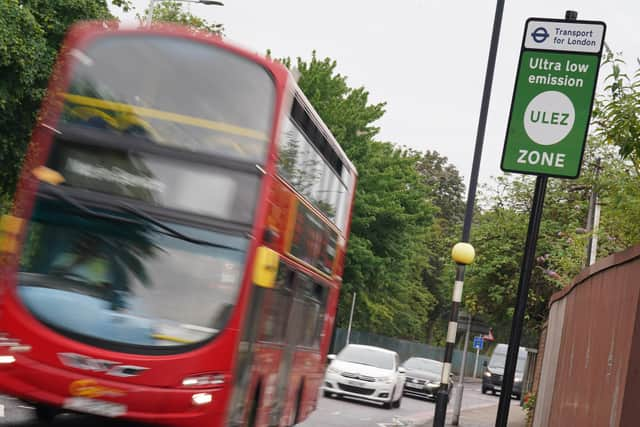Policymaking that delivers sanctions and not benefits is doing more harm to the environmental cause - David Behrens
But last weekend something changed. For the first time since the eco revolution of 1989, when the Green Party emerged from nowhere as the third biggest force at the European election, environmental policies were seen to be turning voters away rather than attracting them.
In between had been three and a half decades of ballot box environmentalism by the main parties, cosying up to electors who had “gone green” while trying not to offend the wealthy industrialists on whom they depend for funds.
Advertisement
Hide AdAdvertisement
Hide AdIt was always a difficult balancing act but the plan by London’s Labour Mayor, Sadiq Khan, to expand his ultra low-emission zone right across the capital finally broke the tightrope. People may be more environmentally conscious than in the 1980s but they recoiled at having to pay £12.50 a day if their car was more than averagely noxious or a £15 congestion charge to get into the West End. As a result, Mr Khan’s party failed to secure its expected victory at the Uxbridge by-election.


You can dismiss this as motorised nimbyism if you like – going all-in for eco-friendliness unless you have to fund it yourself – but that would be to ignore a wider truth about the green agenda, which is that we don’t fully understand it and therefore we don’t trust it. In particular, we can’t fathom why policies that are supposed to improve our lives actually make them worse.
Petrol pollution is a case in point. No-one’s financial situation is going to be improved by getting in hock to buy an electric car that costs twice as much as a normal one and has to be abandoned half way across the M62 because there isn’t a charging point for another 50 miles.
But that’s what we’re expected to have to put up with in the next few years. Virtually no-one thinks it will happen but the initiative has support in high places – from the environmental lobby, of course, but also from a notoriously eco-unfriendly motor industry that sees it as a gift from the gods to sell more new cars than ever before. These combined voices drowned out everyone else until the vote in Uxbridge, when factions of both parties suddenly decided that maybe banning petrol wasn’t such a good idea after all.
Advertisement
Hide AdAdvertisement
Hide AdIt’s the same with your home heating system. Under current plans you will have to swap your £1,500 gas boiler for a £5,000 heat pump that costs less to run but leaves you £3,500 worse off before you’ve even turned it on. If you’re a landlord you will have to do this at every property you own before you can let anyone live there, even if they have nowhere else to live. This too is part of the plan to stop us adding more carbon to the atmosphere than we remove – an equation politicians have taken to calling net zero because they don’t understand what it means, either.
Sadiq Khan justified it by saying Londoners had the right to clean air, and I suppose there’s a first time for everything. But they have other rights, too, and not all are compatible with each other. The Uxbridge election demonstrated that they would rather exercise their right to afford food and pay the mortgage than to drive around their neighbourhoods in cars that have to be plugged in at night.
None of this is a surprise. We have only ever been superficially eco-aware. We’ll buy detergent if it comes in a green box but we never stop to read the small print about its effect on the environment.
And although most of us believe at heart that humans are to some extent destroying the planet, we don’t trust politicians to do anything more about it than tick a few boxes. Congestion charge? Tick. Get rid of diesel cars? Check.
Advertisement
Hide AdAdvertisement
Hide AdMichael Gove, who was environment secretary when the net zero policy was hatched, was re-energised by the result at Uxbridge. Environmentalism could not be treated as a religious crusade, he said, warning – correctly – that evangelical protesters like those who disrupted the snooker at Sheffield and the tennis at Wimbledon were doing more harm than good in the battle to win hearts and minds.
But what is doing the most harm is policymaking that delivers sanctions and not benefits. We may be on the road to another green revolution but must we really have to pay a congestion charge to get there?